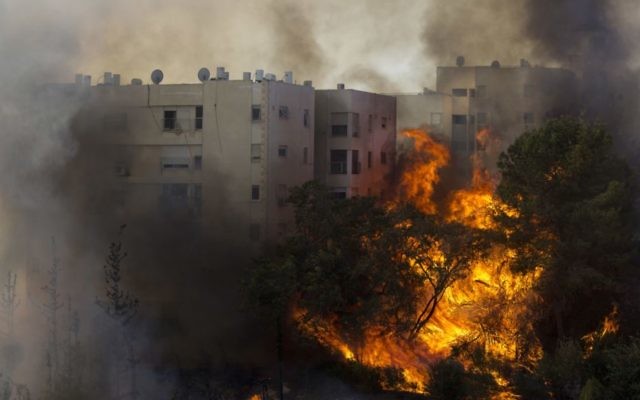Israel counts cost of fires
Israelis are getting their heads around the mark that “arson terror” combined with dry weather has left on their country.
THE flames are out but the scale of the damage is only just becoming clear. Israelis are getting their heads around the mark that “arson terror” combined with dry weather has left on their country.
The story that began as a tragic consequence of bad weather quickly shook Israelis to their core, when authorities announced that arson was to blame in at least some of the cases. Military figures referred to “pyroterrorism”.
The year-long wave of violence against Israelis showed that terror doesn’t need complex planning of explosives, just a kitchen knife or pair of scissors. Now, even miles away from intended targets, all it takes is a box of matches.
“Every fire that was caused by arson, or incitement to arson, is terrorism by all accounts, and we will treat it as such,” said Prime Minister Benjamin Netanyahu, surveying damage in Haifa. “Whoever tries to burn parts of Israel will be punished for it severely.” He said that arson is taken especially seriously because it “draws on the forces of nature to sow death and destruction”.
Large swathes of this small country were affected by the blazes that began last week and continued through last weekend. Haim Outmezgine, a paramedic who rescued Haifa residents, said it was a “miracle” that nobody was killed, and many synagogues treated it as such, reciting psalms by way of thanksgiving during services. When the flames were out in the religious moshav of Beit Meir, residents, with their tzitzit flying in the wild wind, danced ecstatically with the firemen to celebrate the fact that no lives were lost.
Outmezgine has volunteered with the ZAKA rescue and medical service for 22 years, but told The AJN: “I’ve never seen an incident like this.” He was in Haifa, helping locals to evacuate and deal with the shock. Though not a firefighter, he was dousing the small fires, to free up the fire trucks for the major blazes. “Everywhere we went there were flames,” he said.
Nobody was killed, but the impact of the fires was devastating. Some 75,000 people were evacuated, and at the height of the most serious blazes, which were in Haifa, almost one in four of the city’s residents were told to leave their homes. Altogether, almost 2000 homes have been damaged, and an estimated 400 completely destroyed. Around 150 people went to hospital for smoke inhalation, but barring a handful, they were only lightly affected.
Fires were seen as far north as the Galilee and as far south as the Jerusalem area. The Neve Shalom mixed Jewish-Arab village near Jerusalem was badly hit, as was the town of Zichron Yaakov, which is located between Tel Aviv and Haifa. There were several fires in West Bank settlements, and in one case an arsonist was videoed starting the fire.
As Israeli families bedded down in schools and community centres, after watching their homes burn, some people couldn’t hide their glee. The hashtag #israelisburning trended on Twitter – with many sympathetic messages, and some gleeful posts. Arsen Ostrovsky, the Australian-born Israeli activist with a large Twitter following, was trolled by people who are happy about the fires. One wrote: “I pray that u [sic] guys burn on the inside if not the outside.” Somebody stated that they have “never witness[ed] a happier day”, and another Twitter user wrote to him that they want to “offer help” to spread the fire.
Ostrovsky told The AJN, “This highlights how vile and depraved some people are,” adding that anyone who rejoices “lacks a shred of common decency”. He also said that the joy is misplaced as Haifa has a large population of Arabs who live alongside Jewish residents.
One of Haifa’s most prominent Arab residents is Ayman Odeh – leader of the main Arab party in Israel’s parliament, the Joint List – who said that acts of arson are “terrible crimes”. He said in a TV interview: “Whoever did this is an enemy of all of us.” Odeh wrote on Facebook in Arabic and Hebrew: “Now it’s time to pull together and volunteer, Arabs and Jews, and to help to evacuate the elderly and anyone who needs help.”
Despite strong tensions between Jerusalem and Ramallah, the Palestinian Authority provided help – as did a dozen countries including Egypt, Jordan, France, and America, which sent its supertanker, the world’s largest firefighting plane. After a team of 24 Palestinian firefighters battled the blaze, Netanyahu took the unusual step of telephoning Palestinian President Mahmoud Abbas to express thanks.
Israel and Turkey still have an uneasy relationship, despite the recent reconciliation between the two countries. But Ankara also sent firefighters. Israel’s President Reuven Rivlin called his Turkish counterpart Recep Tayyip Erdogan.
“They do wonderful work and we very much appreciate all they do,” said Rivlin, who had met some of the Turkish firefighters.
“I want to thank you from the bottom of our hearts for your decision to send us help when we needed it in fighting the fires. With their brave hearts and abilities, your pilots assisted us greatly.”
Hillel Frisch, a political scientist at Bar-Ilan University near Tel Aviv, told The AJN: “There have been waves [of arson] before but this is by far the most serious and all-encompassing.”
He noted that the year-long terror wave that is underway has often involved items as simple as knives and even scissors, and said: “The fires are similar to this wave of terror in some way – and like with them, you don’t get intelligence to warn you.”
NATHAN JEFFAY


comments